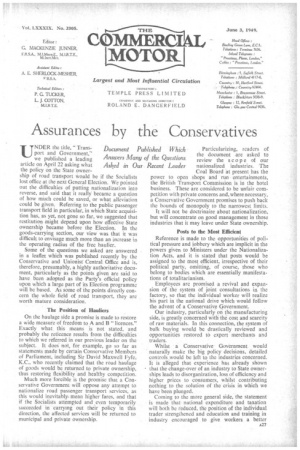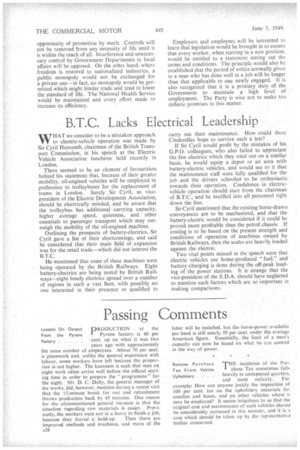Assurances by the Conservatives
Page 1

Page 2

If you've noticed an error in this article please click here to report it so we can fix it.
UNDER the title, " Transport and Government," we published a leading article on April 22 asking what the policy on the State ownership of road transport would be if the Socialists lost office at the next General Election. We pointed out the difficulties of putting nationalization into reverse, and said that it really became a question of how much could be saved, or what alleviation could be given. Referring to the public passenger transport field in particular, in which State acquisition has, as yet, not gone so far, we suggested that restitution might depend upon how effective State ownership became before the Election. In the goods-carrying section, our view was that it was difficult to envisage much more than an increase in. the operating radius of the free haulier.
Some of the questions we asked are answered in a leaflet which was published recently by the Conservative and Unionist' Central Office and is, therefore, presumably, a highly authoritative document, particularly as the points given are said to have been adopted as the Party's official policy upon which a large part of its Election programme will be based. As some of the points directly concern the whole field of road transport, they are worth mature consideration.
The Position of Hauliers On the haulage side a promise is made to restore a wide measure of freedom to A and B "licences." Exactly what this means is not stated, and probably the reticence results from the difficulties to which we referred in our previous leader on the subject. It does not, for example, go so far as statements made by certain Conservative Members of Parliament, including Sir David Maxwell Fyfe, K.C., who recently claimed that the road haulage of goods would be returned to private ownership, thus restoring flexibility and healthy competition.
Much more forcible is the promise that a Conservative Government will oppose any attempt to nationalize road passenger transport services, as this would inevitably, mean higher fares, and that if the Socialists attempted and even temporarily succeeded in carrying out their policy in this direction, the affected services will be returned to municipal and private ownership. Particularizing, readers of the document are asked to review the scope of our nationalized industries. The Coal Board at present has the power to open shops and run entertainments, the British Transport Commission is in the hotel business. These are considered to be unfair competition with private concerns and, where necessary, a Conservative Government promises to push back the bounds of monopoly to the narrowest limits.
It will not be doctrinaire about nationalization, but will concentrate on good management in those industries that it may leave under State ownership, Posts to the Most Efficient Reference is made to the opportunities of political pressure and jobbery which are implicit in the powers given to Ministers under the Nationalization Acts, and it is stated that posts would be assigned to the most efficient, irrespective of their political party, omitting, of course, those who belong to bodies which are essentially manifestations of totalitarianism.
Employees are promised a revival and expansion of the system of joint consultations in, the factory, so that the individual worker will realize his part in the national drive which would follow the advent of a Conservative Government.
Our industry, particularly on the manufacturing side, is greatly concerned with the cost and scarcity of raw materials. In this connection, the system of bulk buying would be drastically reviewed and opportunities restored to expert merchants and traders.
Whilst a Conservative Government would naturally make the big policy decisions, detailed controls mould be left to the industries concerned. It is alleged that experience has already shown that the change-over of an industry to State ownerships leads to disorganization, loss of efficiency and higher prices to consumers, whilst contributing nothing to the solution of the crisis in which we have been plunged. Coming to the more general side, the statement is made that national expenditure and taxation will both be reduced, the position of the individual trader strengthened and education and training in industry encouraged to give workers a better opportunity of promotion by merit. Controls will not be removed from any necessity of life until it is within the reach of all. Interference and unnecessary control by Government Departments in local affairs will be opposed. On the other hand, where freedom is restored to nationalized industries, a public monopoly would not, be exchanged for a private one—in fact, no monopoly would be permitted which might hinder trade and tend to lower • the standard of life. The National Health Service would be maintained and every effort made to increase its efficiency. Employers and employees will be interested to learn that legislation would be brought in to ensure that every worker, when starting in a new position. would be entitled to a statement setting out the terms and conditions. The principle would also be established that the period of notice normally given to a man who has done well in a job will be longer than that applicable to one newly engaged. It is also recognized that it is a primary duty of the Government to maintain a high level of employment. The Party is wise not to make too definite promises in this matter.


























